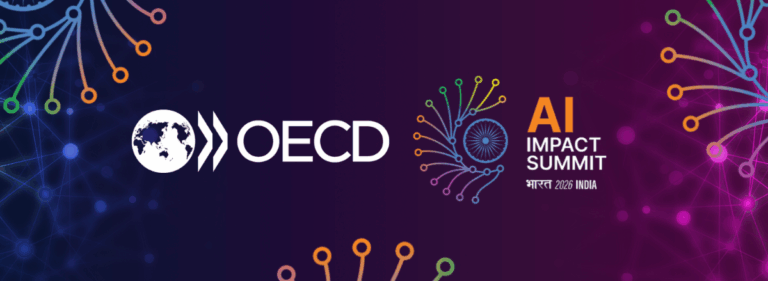Announcing the new OECD.AI Expert Group on AI Futures

“We tend to overestimate the effect of a technology in the short run and underestimate the effect in the long run”. This simple phrase, coined by scientist and futurist Roy Amara and known as Amara’s Law, seems to hold true over and over again. Looking back on fairly recent technological innovation, from smartphones to social media networks, it seems impossible to have foreseen the wildly transformative ways these technologies have impacted our lives and society. However, that’s exactly what we must endeavour to do in order to actively shape how technologies evolve and to help ensure their effects are positive. This has perhaps never been as important as now in the face of breakneck advancements in Artificial Intelligence (AI), which could be one of the most transformative developments in human history.
Exploring potential future risks and benefits of AI
Most AI policy discussions focus on the challenges we already face today, and understandably so. Present-day issues are critical and real – they impact our lives here and now, with policy makers struggling to keep pace with change. Work on some existing issues has been underway at the OECD for some time, including work by the OECD Expert Groups on Risk and Accountability, Incidents, and Compute & Climate. But responsible policymaking also requires us to anticipate and explore possible future developments and plan accordingly.
The implications of potential future developments in AI are fiercely debated and remain uncertain. Still, research and experts have raised concerns about escalating or emerging risks of bias, discrimination, surveillance, lack of accountability, untrustworthy AI systems, job displacement and mass manipulation. More generally, many experts are concerned about the ability to ensure increasingly general AI systems are safe and aligned with human values, prevent the misuse of advanced AI systems, and address other negative societal impacts. On a brighter note, future benefits from AI may be just as great, with the potential to address complex issues, improve health and education outcomes, and accelerate scientific progress. Diverging expert opinions suggest that the impact of future developments in AI varies widely, ranging from a golden age of humanity to an extinction-level risk. The table below lists just a few future potential AI benefits and risks being explored through analysis at the OECD.
Select potential future AI benefits and risks
| Benefits | Risks |
| Strengthen and personalise education systems | Extreme concentrations of power |
| Transform scientific and innovation processes | Cyber weaponry and AI deployed in critical infrastructure |
| Help understand and address complex issues (e.g., climate change) | Inability to control superhuman intelligence |
| Aid sense-making and coordinated decision-making at a global scale | Loss of human heterogeneity |
| More fulfilling and less tedious or dangerous jobs | Disinformation campaigns at scale |
| Reduce or eliminate inequality and poverty | Exacerbate inequality and poverty through digital divides |
A diverse group of experts for insights into potential AI futures
To explore this range of possible futures and equip governments with the knowledge and tools necessary to develop forward-looking AI policies, we have signed on to co-chair the new OECD Expert Group on AI Futures, which will hold its inaugural meeting tomorrow. In the coming months, the group will leverage open dialogue and strategic foresight methods, such as scenario exploration, to provide insights and inform policy approaches related to:
- Key milestones for possible future developments in advanced AI systems.
- Potential medium to long-term benefits and risks of AI.
- Suggested policy approaches and solutions to actively shape plausible AI futures and maximise benefits while mitigating the risks.
- Future trajectories and consideration of broader societal implications for present-day AI systems, such as generative AI.
- Identification and mitigation of risks from the possible advent of artificial general intelligence, taking into account differing views on likelihood and timing.
Over the last several months, we have worked closely with the OECD.AI team and OECD Strategic Foresight Unit to build a membership base of experts that forms a critical and varied spectrum of backgrounds and perspectives. We are pleased to be joined by multi-disciplinary representatives from an array of governments, companies both big and small, universities, and civil society organisations. We have sought to achieve diversity in gender, geography, technical versus policy experience, positions on current debates in the AI community, and subject domains, such as healthcare, education, robotics, human cognition, defence, philosophy, and ethics. Where gaps may exist, we are committed to addressing them. Our full list of members can be found here.
Participate in public consultations and discussions
While we have assembled leading AI experts, we don’t claim to have all the answers. We are also aware of the notorious diversity challenges that the field of AI faces. Because potential AI futures will impact everyone, and to ensure all voices are heard, the OECD Expert Group on AI Futures intends to use inclusive methods. We plan to hold public consultations on draft reports and other products, and open discussions on key topics, allowing anyone to contribute to the same types of discussions held by the Expert Group. This gives a virtual seat at the table to members of the public, whether they be AI developers and researchers, civil society representatives, or individuals who have concerns about how AI may impact their lives.
To get us started, we invite you join in on discussion on the topic listed below, which is one of the overarching questions being explored by the Expert Group. Your insights will help fuel OECD research, and will contribute to the discussions of the expert group.
- Open discussion: What do you see as the as the most significant potential benefits and risks of Artificial Intelligence (AI) 10+ years from now?
The Expert Group’s ongoing work, including open discussions, summaries of meetings, and eventual reports and other products, have a dedicated space on OECD.AI, and a concept note about the group is available here.



































